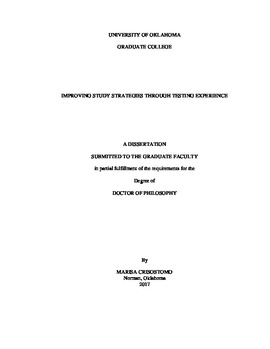| dc.contributor.advisor | Kimball, Daniel | |
| dc.contributor.author | Crisostomo, Marisa | |
| dc.date.accessioned | 2017-05-16T14:11:13Z | |
| dc.date.available | 2017-05-16T14:11:13Z | |
| dc.date.issued | 2017-05-12 | |
| dc.identifier.uri | https://hdl.handle.net/11244/50884 | |
| dc.description.abstract | Prior research on the Testing Effect has shown that testing previously learned material can result in greater long term memory performance than if the material was restudied (Roediger & Karpicke, 2007). Although the testing can be used as a potent learning event, students seldom use testing as a main study strategy. The following studies attempted to determine if students’ study decisions can be influenced by experience of two different study strategies, one more optimal than the other, such that students choose to retrieve more often. The present experiments had participants either retrieve or restudy cue-target word pairs then make a future study decision about whether to retrieve or restudy items. The results suggest that differential experience of study strategies is not necessary to improve study decisions and that study decisions may be resistant to change. | en_US |
| dc.language | en_US | en_US |
| dc.subject | Cognitive Psychology | en_US |
| dc.title | Improving Study Strategies Through Testing Experience | en_US |
| dc.contributor.committeeMember | Gronlund, Scott | |
| dc.contributor.committeeMember | Terry, Robert | |
| dc.contributor.committeeMember | Mendoza, Jorge | |
| dc.contributor.committeeMember | Stewart, Sepideh | |
| dc.date.manuscript | 2017-05-08 | |
| dc.thesis.degree | Ph.D. | en_US |
| ou.group | College of Arts and Sciences::Department of Psychology | en_US |
